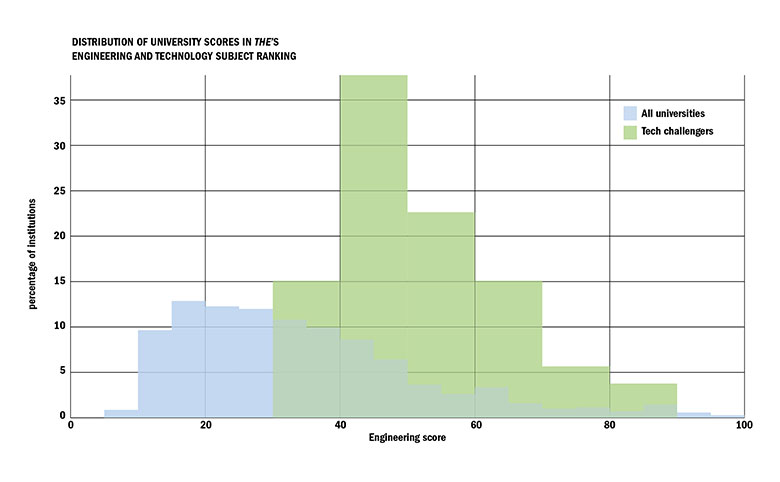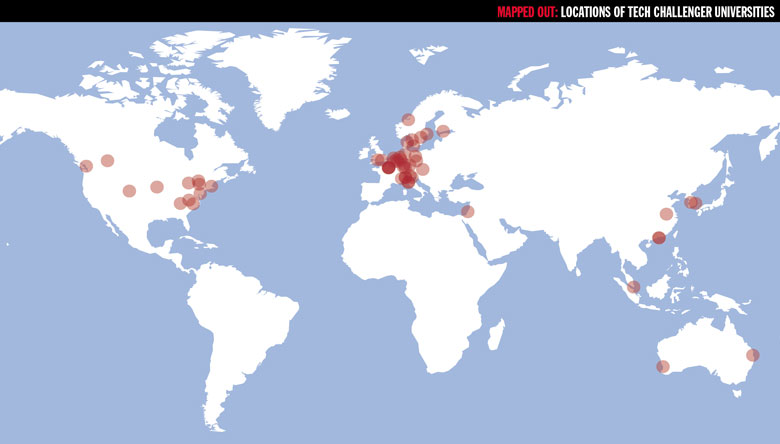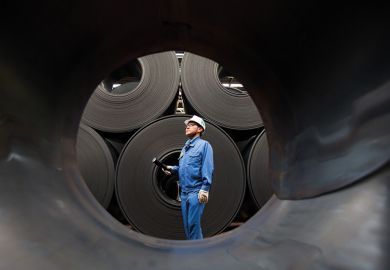Register for the 2017 Innovation and Impact Summit in Hong Kong from 31 May - 2 June
The major problem faced by higher education in the developed world – particularly the West – in the past decade has been adapting to the erosion of public funding as governments, both regional and national, face a cash crisis.
While elite institutions may be able to rely on their long-established reputations and large pots of research funding, universities outside this group have been forced to be fleet-footed and innovative as they strive for other sources of income. Such institutions have sometimes also been those that are used to driving forward innovative areas of research associated with the technological and digital revolution.
A number of these universities can be identified in the latest analysis by Times Higher Education looking at “clusters” of higher education institutions with similar characteristics.
Although they tend to sit just behind the elite “old stars” and up-and-coming “international powerhouses” in THE’s World University Rankings, the 55 “technology challengers” often have innovation at the core of their strategy, strong industry links and research that excels in technological areas like engineering.

Among them are universities in South and East Asia such as the Korea Advanced Institute of Science and Technology (KAIST), whose success has been driven to a large extent by close collaboration with, and income from, commercial firms.
However the majority in the list, which was compiled by THE data scientist Billy Wong, hail from Europe, where diversifying income and building links with the private sector have not always come naturally but have become increasingly important in the face of public funding budget cuts.
École Polytechnique, the highest-ranked French institution in the list, has strength in fields such as engineering and physical sciences that have led to collaborations with large multinational firms such as Fujitsu and Thales. According to its president, Jacques Biot, universities must be attuned to industry if they are to flourish in the present environment.
“I definitely see governments as not being able to funnel more money…into higher education and research and maybe [it will be] less money because they will have more demands. We will fight for the maintenance of public support but if we want to grow…we have to get geared [up] to find money from all types of…source,” he said.
For Mr Biot, working with industry is not just about finding new sources of income either; it is about universities learning how to use the “disruptive technology” now common in the commercial world, students spending time learning in the workplace and encouraging philanthropy among firms.
“I see higher education to some extent as a business because it is highly competitive and it’s highly capital intensive. For this reason I am extremely attentive to what is happening in other industries,” he said.
Anka Mulder, vice-president for education and operations at the Delft University of Technology in the Netherlands – another institution high up the technology challengers list – said her institution had a “long history of working with industry”.
However, as well as such links being about funding and strategy, she also emphasised the importance of creating a “culture of cooperation” among students and academics that influenced the wider world.
On engineering – where Delft comes 20th in the world in THE’s subject ranking – there is a focus on “engineering for society”, which informs both the degree curriculum and the nature of research projects.
On research, Dr Mulder referred to Delft’s work in setting up the Amsterdam Institute for Advanced Metropolitan Solutions together with Wageningen University & Research and the Massachusetts Institute of Technology to “work on sustainable urban solutions together with our university partners and industry”.
An emphasis on engineering and other research solutions that impact society – and link into industry – is also evident at institutions outside Europe.
Register for the 2017 Innovation and Impact Summit in Hong Kong from 31 May - 2 June
Timothy Tong, president of one of the Asian institutions on the list, Hong Kong Polytechnic University, highlighted the former technical college's collaboration with Boeing to set up an aviation research centre in Hong Kong that has developed new automation technology for aircraft maintenance.
He said close ties with companies allowed the university to “always keep abreast of the problems faced by industries, secure support from the field in the various stages of development, trial and implementation, and deliver timely solutions for the benefit of the community”.
There are 12 universities from North America on the list – eight in the US and four in Canada – which share the enthusiasm for slightly different ways of thinking about the culture and purpose of a university.
One of those is the University of Waterloo, which runs one of the most successful programmes in the world for students spending part of their degree working in industry, using an approach known in Canada as cooperative education.
For George Dixon, Waterloo’s vice-president for research, the cooperative programme is far from being just about an experiential way of learning for students – it is also a key that unlocks the commercial world to the university in many other ways.
“When you have students who are going out to [thousands of] different employers…you have got the basis for a door opener with the private sector right there,” he said. “Nobody likes a cold call so any opportunity you get to get a foot in the door is an opportunity to grow."
It is not just a local door opener either. Of the almost 6,700 employers that now take part in Waterloo’s cooperative programmes, 2,600 are outside Canada, which gives the university a massive international reach, both commercially and with other universities abroad too.
Companies involved with the cooperative programme that have been the catalyst for this kind of international research collaboration have included IBM, Cisco Systems and General Motors.
“Often if you are working with a large multinational company, they will have partnerships with universities in other countries," Professor Dixon pointed out.
simon.baker@timeshighereducation.com
Full list of 55 tech challenger universities, ranked by overall score in THE World University Rankings
POSTSCRIPT:
Print headline: Industry links key to technology challengers
Register to continue
Why register?
- Registration is free and only takes a moment
- Once registered, you can read 3 articles a month
- Sign up for our newsletter
Subscribe
Or subscribe for unlimited access to:
- Unlimited access to news, views, insights & reviews
- Digital editions
- Digital access to THE’s university and college rankings analysis
Already registered or a current subscriber?











